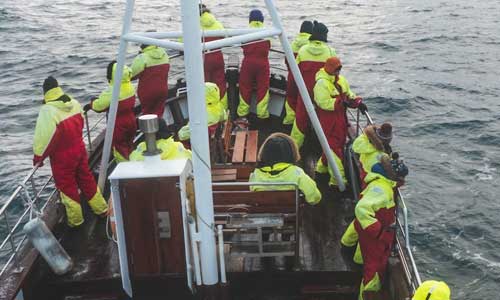The Sea Sheppard is an organisation responsible for protecting marine wildlife worldwide. They strive to conserve the world’s oceans with a fleet of boats and ships that are dedicated to the enforcement of conservation laws and regulations that protect the oceans.
They have launched several anti-whaling campaigns over the years to protect sovereign waters against illegal or unregulated fishing. They have resources available to patrol, monitor, and enforce government laws and regulations.
The Sea Shepherd embarked on its first anti-whaling campaign in 2002. The crew of the Farley Mowat was led by captain Paul Watson. They tracked the Japanese whaling fleet in the Southern Ocean Whale Sanctuary. This led to exposing Japan’s JARPA II Whaling Program and its illegal activities.

The second major campaign against illegal whaling had the Farley Mowat pursue the Japanese whaling fleet for more than six weeks in 2005 and completely disrupted the Japanese whaling fleet’s activities along the Antarctic coast. The Sea Shepherd tracked the Japanese vessels for more than 16 000 kilometres.
Operation Leviathan in 2006 was an anti-whaling campaign led by two ships. The Farley Mowat and the Robert Hunter intercepted the Japanese Whaling fleet and managed to save the lives of hundreds of whales in the process.
The success of The Sea Shepherd was followed by Operation Migaloo, which was also documented by a film crew from Animal Planet. The campaign led to an exchange of violent behaviour, but eventually, The Sea Shepherd managed to save more than 500 whales that were targeted by the Japanese fleet.
Operation Musashi began when the formidable vessel Steve Irwin departed from Brisbane, Australia. Accompanied by an international volunteer crew of 48 people, they embarked and headed for the Southern Ocean Whale Sanctuary. The campaign managed to intercept the Japanese whaling fleet in just a few weeks and managed to save hundreds of whales.
In 2009 the vessel, Waltzing Matilda, tracked down a Japanese harpoon vessel in the conservation area. They sabotaged Japanese vessels and dealt considerable damage to the Japanese whaling fleet. The Sea Shepherd team managed to save more than 500 whales during the campaign.
Other notable whale defence operations include Operation No Compromise in 2010, Operation Devine Wind in 2012, Operation Zero Tolerance in 2012-2013, Operation Relentless in 2014, and many others.
The efforts of Sea Shepherd have saved more than 6,000 whales to date. This allows future generations to continue cherishing these magnificent creatures in the wild.

